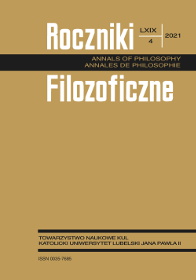Daniel C. Dennett’s Language of Consciousness
Abstract
The paper discusses the lingual genesis of consciousness. The author reconstructs Daniel C. Dennett’s naturalization strategy, showing how, according to Dennett, language enables the emergence of consciousness in the evolution of humankind. This naturalization assumes a behavioristic view according to which consciousness is a covert verbal behavior. The author shows that Dennett adopts and transforms Mead’s, Skinner’s, and Jaynes’s original behavioristic approaches inscribing them into a course of human evolution. This inscription leads to specific problems discussed in the final part of the paper:
There are actually two definitions of consciousness in Dennett’s philosophy—first says that consciousness is a kind of verbal behavior, second says that it is a virtual memetic machine.
There is no explanation of the execution rule that could show how given mind content becomes conscious; Dennett introduces the competition metaphor instead. Some contentful events in the brain (mind contents) simply win with others. Inscription of the possible scenario of consciousness development in the evolutionary landscape does not mean that one can testify the theory yet.
References
Bayne, Thomas i Elisabeth Pacherie. 2006. „Narrators and Comparators: The Architecture of Agentive Self-Awareness” vol. 159, no. 3: 475–491.
Bickerton, Derek. 1990. Language and Sepcies. Chicago: The University of Chicago Press.
Bremer, Józef. 2005. Jak to jest być świadomym? Analityczne teorie świadomości a problem umysłu. Warszawa: Wydawnictwo IFiS PAN.
Davidson, Donald. 1992. Eseje o prawdzie języku i umyśle. Red. Barbara Stanosz. Warszawa: Wydawnictwo Naukowe PWN.
Deacon, Terrence W. 1997. The Symbolic Species. The Co-Evolution of Language and the Brain. London/New York: Norton & Co.
Dennett, Daniel C. 1981. Brainstorms. Philosophical Essays on Mind and Psychology. Boston: The MIT Press.
Dennett, Daniel C. 1994a. „The Role of Language in Intelligence”. W: What is Intelligence?, red. Jean Khalfa, 161–178. Cambridge: Cambridge University Press.
Dennett, Daniel C. 1994b. „Self as a Center of Narrative Gravity”. W: Self and Consciousness: Multiple Perspectives, red. Frank S. Kessel, Pamela M. Cole, Dale L. Johnson, 103–115. Hilsdale/London: Lawrence Erlbaum Associates.
Dennett, Daniel C. 1995. Darwin’s Dangeroeus Idea. Evolution and the Meanings of Mind. Boston: The MIT Press.
Dennett, Daniel C. 1997a. „How to do Other Things with Words?” Royal Institute of Philosophy Supplements 42: 219–235.
Dennett, Daniel C. 1997b. Natura umysłów. Tłum. Witold. Turopolski. Warszawa: Wydawnictwo CIS.
Dennett, Daniel C. 1998. Brainchildren. Essays on Designing Minds. Boston: The MIT Press.
Dennett, Daniel C. 2005. Słodkie sny. Filozoficzne przeszkody na drodze do nauki o świadomości. Tłum. Marcin Miłkowski. Warszawa: Wydawnictwo CIS.
Dennett, Daniel C. 2016. Świadomość. Tłum. Ewa Stokłosa. Kraków: Copernicus Center Press.
Dennett, Daniel C. 2017a. Dźwignie wyobraźni i inne narzędzia do myślenia. Tłum. Łukasz Kurek. Kraków: Copernicus Center Press.
Dennett, Daniel C. 2017b. Od bakterii do Bacha. O ewolucji umysłów. Tłum. Krystyna Bielecka i Marcin Miłkowski. Kraków: Copernicus Center Press.
Derksen, Anthony. 2005. „Dennett’s Rhetorical Strategies in Consciousness Explained”. Journal for General Philosophy of Science / Zeitschrift für allgemeine Wissenschaftstheorie 36, no. 1: 29–48.
Donald, Merlin. 1991. Origins of the Modern Mind: Three Stages in the Evolution of Culture and Cognition. Cambridge: Harvard University Press.
Fitch, Tecumsech. 2005. The Evolution of Language. Cambridge/New York: Cambridge University Press.
Gadamer, Hans-Georg. 2000. Rozum, słowo, dzieje. Tłum. Małgorzata Łukasiewicz i Krzysztof Michalski. Warszawa: PIW.
Gärdenfors, Peter 2010. Jak homo stał się sapiens? O ewolucji myślenia. Tłum. Tomasz Pańkowski. Warszawa: Wydawnictwo Czarna Owca.
Gazzaniga, Michael. 1998. The Mind’s Past. Oakland: University of California Press.
Husserl, Edmund. 2000. Badania logiczne. T. 2, cz. 1. Przełożył Janusz Sidorek. Seria: Biblioteka Klasyków Filozofii. Warszawa: Wydawnictwo Naukowe PWN.
Jaynes, Julian. 2000. The Origins of Consciousness in a Breakdown of Bicameral Mind. Boston/ New York: Houghton Mifflin Company.
Kang, Wi Jo. 1976. G. H. Mead’s Concept of Rationality: A Study of the Use of Symbols and Other Implements. The Hague/Paris: Mouton.
Kant, Immanuel. 2005. Antropologia w ujęciu pragmatycznym. Tłum. Ewa Drzazgowska i Paulina Sosnowska. Warszawa: Wydawnictwo IFiS PAN.
Krupenye, Christofer, Fumihir Kano, Satoshi Hirata, Josep Call, Michael Tomassello. 2016. “Great apes anticipate that other individuals will act according to false beliefs”. Science vol. 354: 110-114.
Lohmar, Dieter. 2016. Denken ohne Sprache. Phänomenologie des nicht-sprachlichen Denkens bei Mensch und Tiere im Licht der Evolutionsforschung, Primatologie, Neurologie. Seria: PHAE, vol. 219. Springer International Publishing Switzerland.
Marzęda, Witold. 2016. „Sceptyczne tropy Wittgensteina i transcendentalizm”. Folia Philosophica 36: 61–78.
Mead, George H. Umysł, osobowość, społeczeństwo. Tłum. Zofia Wolińska. Warszawa: PWN, 1975.
Morris, Charles W. 1972. „Preface” do: George H. Mead. Mind, Self and Society: From a Standpoint of a Social Behaviorist. London/Chicago: University of Chicago Press.
Ong, Walter J. Oralność i piśmienność. Słowo poddane technologii. Tłum. Józef Jopola. Warszawa: Wydawnictwa Uniwersytetu Warszawskiego, 2011.
Platon. 2000. Dialogi. T. 2. Przełożył Władysław Witwicki. Kęty: Antyk.
Roser, Mathew, i Michael Gazzaniga. 2004. „Automatic Brains—Interpretive Minds”. Current Directions In Psychological Science 4: 56–59.
Skinner, Barrus F. 2013. Behawioryzm. Tłum. Piotr Skawiński. Sopot: Gdańskie Wydawnictwo Psychologiczne.
Skinner, Burrhus. F. 1953. Science and Human Behavior. New York: Free Press.
Tomasello, Michael. 2002. Kulturowe źródła ludzkiego poznawania. Tłum. Joanna Rączaszek. Warszawa: PIW.
Wittgenstein, Ludwig. 2000. Dociekania filozoficzne. Tłum. Bogusław Wolniewicz. Seria: Biblioteka Klasyków Filozofii. Warszawa: Wydawnictwo Naukowe PWN.
Copyright (c) 2021 Roczniki Filozoficzne

This work is licensed under a Creative Commons Attribution-NonCommercial-NoDerivatives 4.0 International License.





